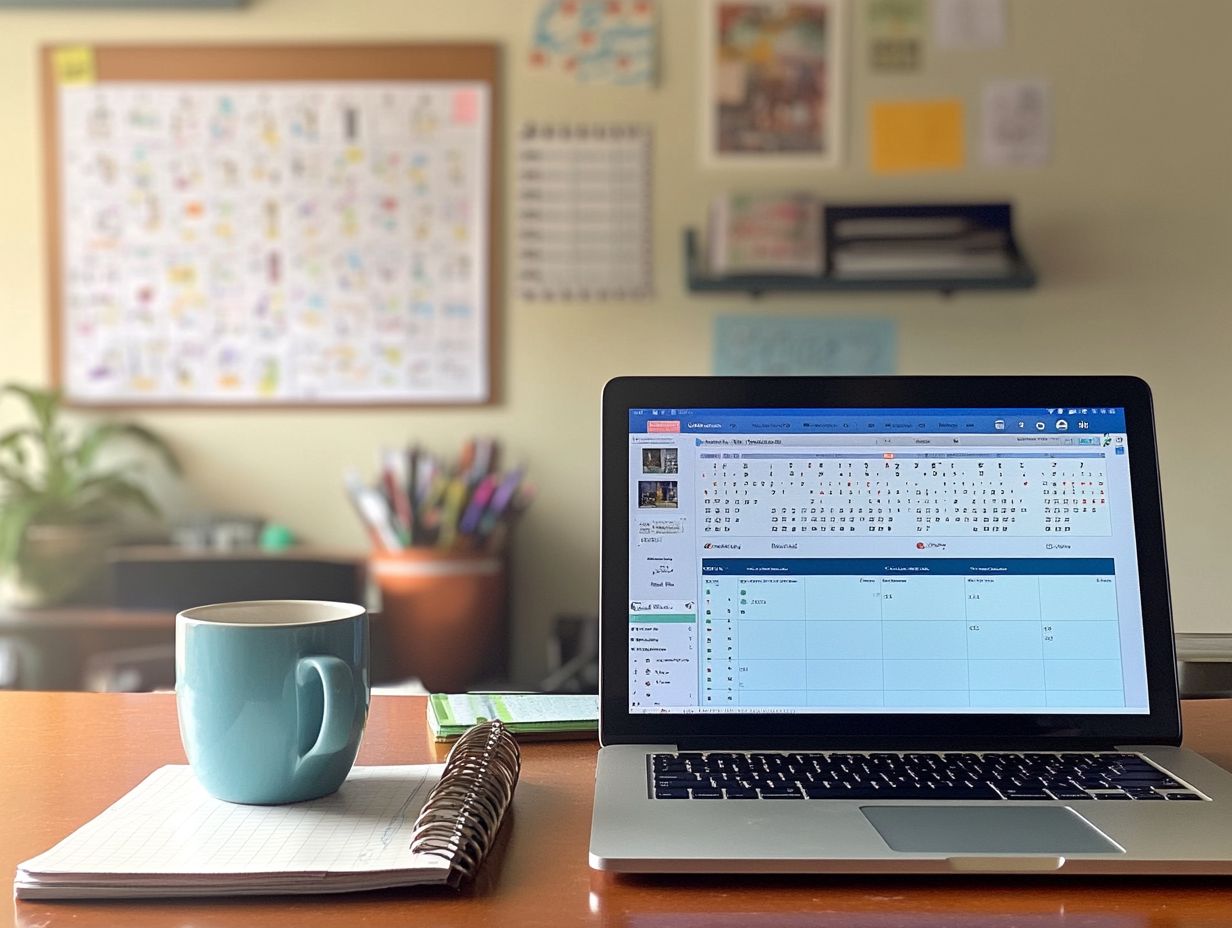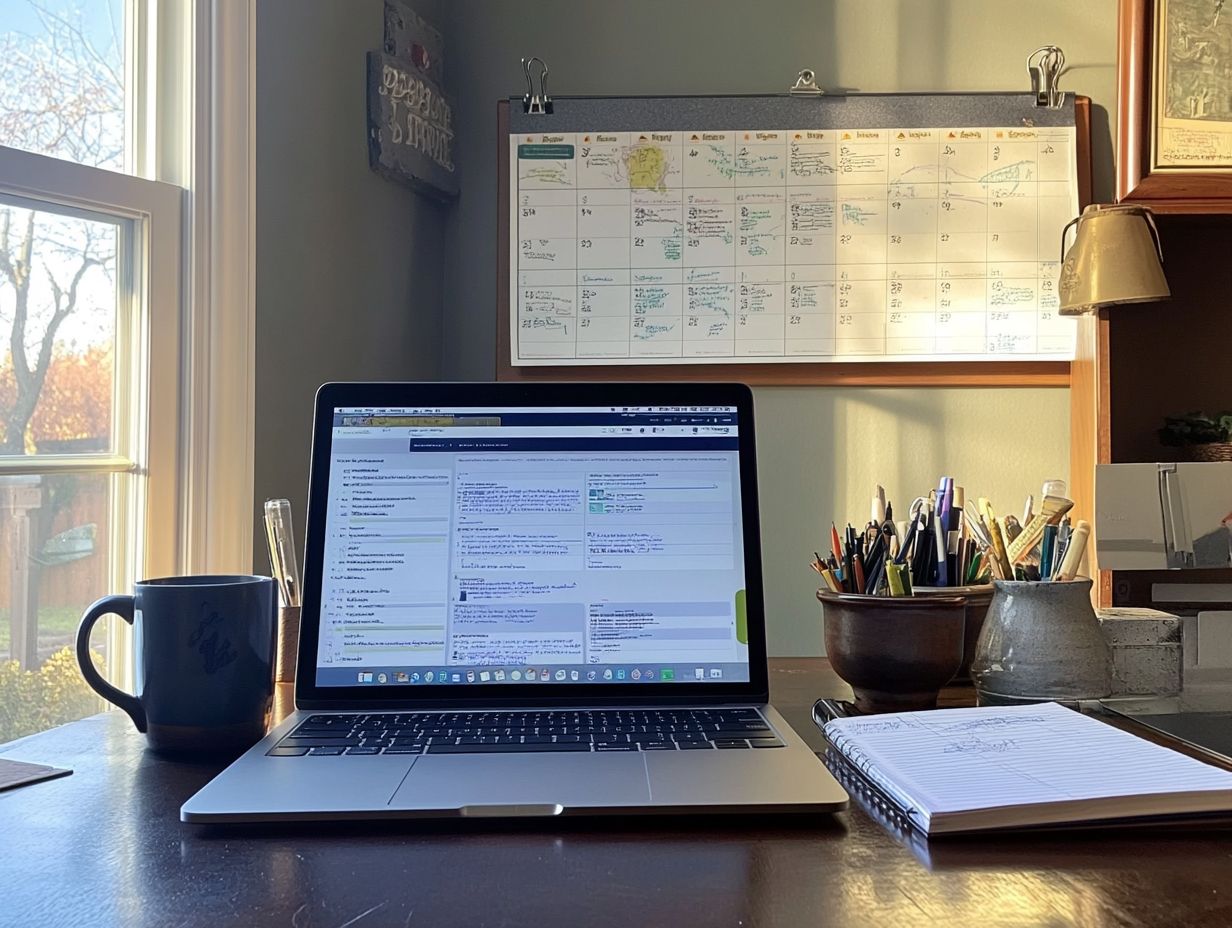how to create a language learning routine
Creating a language learning routine is crucial for anyone eager to master a new language. Get ready to discover valuable insights just for you!
The secret to your success lies in consistency, goal-setting, and effective practice. This guide delves into the benefits of establishing a routine, helping you identify your personal motivations and offering tips for crafting a schedule that effortlessly fits into your daily life.
You ll learn how to select the right materials, employ techniques for effective retention, and discover strategies to keep your motivation high while navigating challenges. You ll discover ways to enhance your learning through immersion and cultural experiences.
Contents
- Key Takeaways:
- Why a Language Learning Routine is Important
- Setting Goals for Language Learning
- Creating a Schedule for Language Learning
- Choosing the Right Learning Materials
- Practicing and Reviewing Your Language Skills
- Staying Motivated and Overcoming Challenges
- Expanding Your Language Learning Routine
- Frequently Asked Questions
- What is a language learning routine and why is it important?
- How do I start creating a language learning routine?
- What are some effective activities to include in a language learning routine?
- How can I stay motivated to stick to my language learning routine?
- Should I follow the same routine every day?
- Is it okay to make changes to my language learning routine?
Key Takeaways:

Consistency is key to language learning; set a routine and stick to it for optimal progress and retention. Additionally, learning how to make the most of language learning resources is essential. Identify your motivation and objectives to create a focused and personalized learning plan.
Incorporate different techniques and resources into your routine, and continuously review and practice to improve and maintain progress.
Why a Language Learning Routine is Important
Establishing a language learning routine is essential for anyone aiming to achieve fluency in a new language, like Spanish. A well-structured study plan enables you to set clear language goals and track your progress through manageable tasks. Additionally, learning how to integrate language learning into daily life can further enhance your skills.
By weaving consistent practice into your daily rhythm, you can markedly enhance your vocabulary and overall language skills. This approach makes the learning experience both effective and enjoyable.
Benefits of Consistency
The benefits of consistency in language learning are significant and transformative. Regular practice allows you to track your progress effectively and achieve milestones that serve as motivation throughout your journey.
By engaging in consistent practice, you ll notice a remarkable increase in your vocabulary retention, giving you the power to use new words with ease in conversations.
This ongoing exposure fortifies your memory and enhances your listening and speaking skills, boosting your confidence as a communicator. For instance, utilizing structured language textbooks while participating in lessons that reinforce grammar and vocabulary provides you with a robust foundation.
Incorporating interactive methods, such as language apps or conversation groups, can further enrich your learning experience by promoting the real-life application of your skills. Ultimately, the synergy created by consistent practice and diverse study tools enables you to advance more effectively, deepening your overall understanding of the language.
Setting Goals for Language Learning
Establishing clear language goals is crucial for steering your learning journey and adding structure to your study plan. This approach allows you to differentiate between short-term objectives, such as mastering everyday vocabulary, and long-term aspirations, like achieving fluency in conversation.
Identifying Your Motivation and Objectives
Understanding your motivation for learning a language is essential; it shapes your goals and enhances your engagement in personalized learning experiences tailored to your interests. This motivation can arise from various sources, whether it s a strong interest in culture that drives your desire to connect with your heritage or a career aspiration that demands effective communication in today s global marketplace.
By recognizing these motivating factors, you can implement practical techniques to enrich your journey. For instance, language exchange programs allow you to practice speaking with native speakers, immersing yourself in authentic dialogues and cultural nuances.
Engaging in immersive experiences, such as travel or local community events, provides context-rich environments that make the learning process more impactful and deeply fulfilling.
Creating a Schedule for Language Learning

Crafting a meticulously structured study schedule is essential for mastering time management in your language learning journey. This approach allows you to designate specific time slots for daily practice.
For instance, set a daily 30-minute time block for vocabulary practice, enabling you to progressively enhance your language skills with precision and purpose. To maximize your efforts, learn how to use language learning software effectively. Start crafting your schedule today and unlock the door to fluency!
How to Incorporate Learning into Your Daily Routine
Incorporating language learning into your daily routine is possible with effective time management. By integrating manageable tasks, you can develop your language skills without feeling overwhelmed.
Setting aside just a few minutes each day for language apps like Duolingo or Babbel allows you to turn brief, enjoyable sessions into productive practice.
Engaging in conversations with native speakers through language exchange meetups or online platforms like Tandem gives you invaluable real-world experience and boosts your confidence.
Diving into captivating content such as podcasts, audiobooks, or short stories in your target language keeps your learning stimulating and relevant. Consistent practice with these tools makes acquiring a new language a natural part of your everyday life.
Choosing the Right Learning Materials
Selecting the right learning materials is crucial for getting the most out of your language learning. These materials form the foundation of your study plan and can greatly impact your fluency levels.
Choosing wisely ensures you re truly mastering the language.
Factors to Consider When Selecting Resources
When choosing resources for your language learning journey, consider effectiveness, engagement, and personalization. These factors can significantly influence your success.
Examine how these resources align with your learning style. Different approaches can boost understanding and retention.
Some learners thrive in environments that mimic real-life conversations. Others may find culturally relevant content resonates more with their backgrounds and interests.
By assessing how well resources cater to various preferences whether auditory, visual, or kinesthetic you can create a richer experience.
This approach fosters language acquisition while deepening your connection to the culture surrounding your new language.
Practicing and Reviewing Your Language Skills
Practicing and reviewing your language skills regularly is essential for solidifying your knowledge. This empowers you to tackle both your speaking and writing skills effectively.
Effective Techniques for Retention and Improvement

Effective techniques for retention and improvement are key in your language learning journey. These methods reinforce knowledge through diverse activities and engagement.
Incorporating strategies like spaced repetition helps you remember vocabulary efficiently. Flashcards provide quick assessments of your progress, turning memorization into a dynamic experience.
Immersing yourself in the language with listening exercises and conversation practice places you in real-world contexts, enhancing your fluency. Language coaches and interactive lessons guide you through these techniques, ensuring a customized experience aligned with your goals.
Staying Motivated and Overcoming Challenges
Keep your motivation high as you tackle the challenges of language learning. Embrace hurdles with determination, empowering yourself to push through and enhance your skills effectively.
Tips for Maintaining Consistency and Progress
To maintain consistency and effectively track your progress in your language journey, implementing structured goals and regular check-ins can profoundly influence your overall development.
Incorporating practical strategies, such as adjusting your study schedule to align with personal commitments, proves to be particularly advantageous.
By emphasizing time allocation, you can dedicate specific hours to practice. This effectively minimizes procrastination.
Utilizing management tools like calendars or apps designed to track your study habits will help you visualize your progress over time.
A structured approach helps you stay on track and spot areas to improve!
Regularly engaging with language partners can enhance your consistency in learning, ensuring that your journey toward fluency remains enjoyable.
Expanding Your Language Learning Routine
Expanding your language learning routine to include immersive experiences like engaging with native speakers or exploring cultural insights can significantly elevate your fluency and enrich your comprehension of the language.
Incorporating Immersion and Cultural Experiences
Incorporating immersion and cultural experiences into your language learning journey provides enriching contexts to practice your listening skills and conversational abilities, enhancing your overall fluency.
For instance, attending local language meetups allows you to engage directly with native speakers, fostering authentic conversations that structured lessons can t replicate.
Watching films in your target language exposes you to colloquial phrases and various accents, making it an effective study tool that beautifully complements language apps focused on vocabulary building.
Participating in cultural festivals takes your learning experience a step further. This encourages interaction with native speakers while familiarizing you with cultural nuances, enhancing your understanding of the language and deepening your appreciation of it.
Frequently Asked Questions

What is a language learning routine and why is it important?
A language learning routine is a set of activities and practices that you follow regularly to improve your language skills. To enhance your efforts, consider how to create a language learning study plan, as it helps you stay organized, motivated, and consistent in your language learning journey.
How do I start creating a language learning routine?
The first step is to set clear and achievable goals for your language learning. Then, identify the areas you want to focus on, such as speaking, listening, reading, or writing. Finally, consider how to create an immersive language learning environment that works for you and includes a variety of activities to make your routine more effective.
What are some effective activities to include in a language learning routine?
Some effective activities to include in your language learning routine are practicing with native speakers, listening to podcasts or audiobooks, reading books or articles, watching movies or TV shows in the target language, and writing in a journal.
How can I stay motivated to stick to my language learning routine?
One way to stay motivated is to regularly track your progress and celebrate your achievements. Set small and achievable goals to keep yourself motivated. You can also join a language learning community or find a study buddy to stay accountable.
Should I follow the same routine every day?
No, it is important to switch up your routine and include different activities to keep things interesting and to avoid getting bored. However, make sure to consistently practice and review the language to see progress.
Is it okay to make changes to my language learning routine?
Yes, it is important to constantly evaluate and adjust your routine as your language skills improve or as your schedule or goals change. Be open to trying new activities and fine-tuning your routine to make it more effective and enjoyable.
Excited to start? Dive into your language learning routine today!






